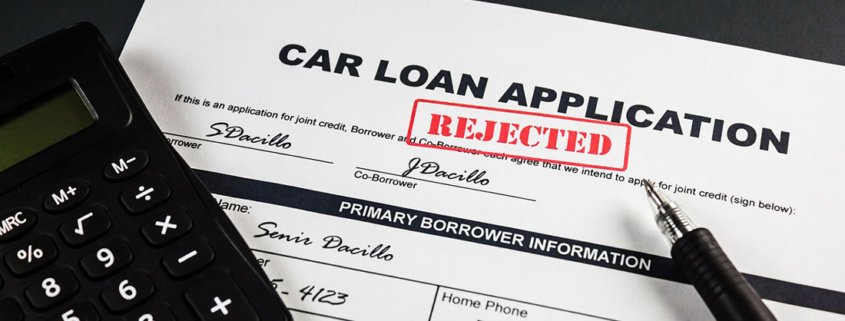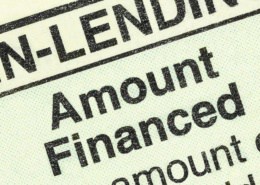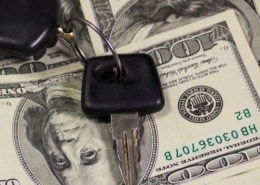How to Get Your Credit Scores Online
Know Your Credit Score Before Applying for a Car Loan
One of the most important things you can do before applying for an auto finance loan is to get your credit report and review your credit scores.
Your credit score is one of the essential factors in determining what annual percentage rate (APR) you will be charged when financing a car. You should know what information the lenders have on you.
Table of Contents
- What is a consumer credit report?
- What is a FICO® score?
- How your FICO score 9 model is calculated
- Quick Facts about credit scores
- Why you should review your credit history
- Not knowing your credit score may cost you
- Will requesting your credit reports hurt your score?
- How to get your credit history and scores online
What is a Consumer Credit Report?
A Consumer Credit Report is a file based on your personal credit history and is kept and managed by a credit bureau.
This report acts basically like your personal financial report card for banks and lenders to determine your history of paying back loans.
Don’t let the guy you’re applying for your loan with know more about your credit history than you do!
The three well-known credit bureaus are TransUnion, Equifax, and Experian. Your credit file will contain personal information like your name, address, social security number, birth date, public records, and credit and loan payment history.
Credit grantors such as banks and lenders will report negative and positive payment information to these credit bureaus. Utilities like electric and phone companies and medical and student loans may also report your payment history to the credit bureaus.
Anytime you apply for credit, including a credit card or car loan, credit grantors may inquire and review your past credit history by using your credit reports to get this information. You do not want to be disadvantaged by not knowing what’s been reported to your credit bureaus.
Companies that pull your credit report do not have to give you a copy of your credit file, even if you request it. They must pay for the privilege to obtain this information about you; believe it or not; your information becomes their property.
What is a FICO® Score?
The FICO® (Fair Isaac Corp.) score is like a grade in school; most car dealers call it a “beacon score.” It ranges from around 300 to 850. Most people fall in between the 500 to 800 range. Financial institutions base their risk assessment of you based on your credit history. The higher your number is, the lower risk you are of paying back a loan.
A higher score will also help you qualify for the lowest interest rates and participate in special low-interest rate finance incentives and programs—the lower your credit score, the higher your risk to the lender. You’ll have to pay higher interest rates and may be subject to larger down payments, additional fees, or not be able to get an auto loan at all.
Car dealers obtain credit bureaus through 3 major companies TransUnion, Equifax, and Experian. Some dealers will pull your credit report from one company, and others may pull a combination of all three.
When car dealers “pull your credit,” the system they use sometimes has an auto-enhanced scoring system. The system looks at your automotive and installment history on your credit bureau and gives you a little boost in your credit score. You’ll know if the dealer is using an enhanced system if your credit score is higher on the report they pull on you than the credit score on the credit report you obtained personally.
How Your FICO Score 9 Model is Calculated
FICO 9 is the latest version of the credit scoring model, which was first introduced in 1989. Using the FICO Score 9 model, your score is a three-digit number mathematically calculated from five different areas of your credit bureau. These areas include:
- 35% = Your overall payment history.
- 30% = How much money you still owe to creditors.
- 15% = Time on bureau or length of your credit history.
- 10% = New credit or new open trade lines.
- 10% = Other factors such as types of credit used.
Quick Facts About Credit Scores
- A credit score is just a “snapshot” of your credit history at any particular time.
- Checking your credit score does not lower your score,
- Debit card use does not affect your credit score.
- Employers may check your credit history before hiring you.
- Good or bad credit history will count towards your credit score for seven to ten years.
- Your credit score will affect the interest rate you pay when applying for a loan.
- How much money you make does not affect your score.
- Your score may affect how much you pay for car insurance.
When Should You Review Your Credit History?
You will want to know if any inaccuracies have been reported to your credit reports before applying for a car loan. It can be very unsettling to find out that a $250 charge off has been reported to your credit bureau a year ago by mistake, and it has dropped your credit score by 100 points.
To make matters worse, you’re right in the middle of trying to finance a car.
You mustn’t let the person you’re applying for credit or a loan know more about your credit history than you do. Not knowing what’s been reported to your credit history will put you at a severe disadvantage and may cost you hundreds, if not thousands of dollars, of unnecessary interest charges.
Other scams you may hear from a dealer.
- With your past credit history, we will have to charge you a higher interest rate.
- I’m sorry, Mr./Mrs. By law, we are not allowed to show you your credit report.
- Your credit score will not qualify for a 48-month term, but we can approve you for a 60 or 72-month period. The good news is your payment will be lower.
- Your score does not qualify for our special 1.9% program. We can sell you the car, but we’ll have to charge you a higher rate.
- We cannot get you into that car with your credit history; you’ll have to buy this cheaper car.
- The only way we can get you approved is if you buy an extended warranty also. The lender wants to ensure you can pay for the repairs if the car breaks down.
Did You Know?
- Always include an additional $10, $20, $50 or $100 to your monthly car loan payment. Note the additional payment is to be used towards the principle amount of your car loan.
- The additional money will add up over time reducing interest charges, build equity faster and pay off your vehicle that much quicker.
- Most reputable lenders do not have early payoff penalties. Make sure you read your contract to confirm this information.
Not Knowing Your Credit Score Will Cost You
Dealerships and lending institutions use a tier system. Usually, this system is based on credit scores and will look something like this.
Typical credit tiers lenders and use:
- Tier 1 or A+ = 740 – 850
- Tier 2 or A = 700 – 739
- Tier 3 or B = 660 – 699
- Tier 4 or C = 581 – 659
- Tier 5 or D = 520 – 580
- Tier 6 or F = Below 520
If you have a 745 credit score, you would fall in the tier 1 or A+ credit category and qualify for the best rates. However, if you’re unaware of your credit score, the dealer may tell you your score was only 725, which is still very good but drops you down into a lower tier, and they can charge you a higher interest rate.
The car dealership or finance institution will use your credit score to determine the interest rate they will charge you for the loan. They may say you qualify for 4% when you qualify for 2%.
Now 4% sounds good, but you’re still leaving money on the table and paying 2% more than you need be. This is just one of the many ways car dealerships make excessive money off you when you finance a vehicle with them. What will a 2% bump in interest rate cost you over the life of your car loan? Let me show you.
| Total cost of a 2% bump in rate on a 60 month car loan. | ||
|---|---|---|
| $47,077 | = | Average new car price in 2021 |
| $866.99 | = | 60 Month Payment at 4% APR |
| $825.15 | = | 60 Month Payment at 2% APR |
| $41.84 | = | Difference in payments |
| $2,510.40 | = | Payment difference x 60 months |
A slick-talking finance manager closing you at a 2% higher interest rate than what you qualify for will make his day and cost you over $2,510 over the life of the loan. That breaks down to about $41.84 added to your monthly payment in this scenario. I’m here to tell you that this happens all day, every day, to unsuspecting customers.
I didn’t include tax, title, license, or misc in the above example. If you were to roll TT&L into your loan, you’d pay even more. When paying interest on tax, title and license are not good money management. Save yourself some money, review your credit report and scores, learn why it’s essential to put cash down when buying a car, and never roll your TT&L into your car loan.
Will Requesting My Credit Report Lower My Score?
Inquiring about your credit reports will not hurt or lower your credit score. When you request your credit report, it’s considered a “soft inquiry” or “soft pull.”
A soft pull will not lower your credit score and will not show up on your credit reports when a bank or lender views it.
A “hard inquiry” or “hard pull” is when a company requests your credit report when applying for credit or a loan.
Too many hard pulls on your credit will make a lender believe you’re trying to over-extend yourself and potentially lower your credit score.
How to Get Your Credit Report and Scores Online
The three major credit bureaus are Experian, TransUnion, and Equifax. Each company will allow you to get your credit report and score online through their secure websites.
By law, in the United States. You have the right to receive a free copy of your credit report annually. However, your FICO Score will not be included with these free reports.
There are some Internet sites out there that will provide you with a free credit report. After receiving your free report, you will be asked if you’re interested in purchasing your credit score. You will be directed to one of the three major credit bureaus.
I’ve included a direct link so you may get all three of your credit reports, credit scores, and credit history below. My Free Score Now also offers credit monitoring products. They have great products for you to pick from, so choose the one that best fits your individual needs.
As rampant as identity theft is today in our electronic world, I would personally select a product that monitors your credit report and provides you with email alerts with any changes to protect your identity.
My Free Score Now takes your privacy very seriously; before clicking the submit button, double-check the information you provide for accuracy.
Recommended Credit Score Company
MyFreeScoreNow will allow you to receive your credit reports and scores from all three bureaus (Experian, Equifax, and Transunion) by signing up for their free trial. Regarding credit score monitoring, identity protection, and credit report information, MyFreeScoreNow is the best value for the money. They offer several products for you to choose from, and their customer service is second to none. Benefits of MyFreeScoreNow:
- 1-day free trial credit monitoring
- Instantly access your credit scores from all three bureaus
- Unlimited viewing access
- Secure online delivery for your convenience
- Credit score dispute center
- Interactive tools and learning center
- Daily credit monitoring & alerts
- Personalized customer service
Shopping for a Car?
Before visiting a dealership to buy a new car, it’s essential to know the dealer invoice price and what other people are paying for the vehicle in your local area. Otherwise, you won’t know a reasonable price to pay for any car you’re looking to buy.
Learn how to have dealers compete with each other online before ever stepping foot inside a dealership to guarantee you pay the best new car price and avoid any modern-day car dealer scams.
I highly recommend using an online referral service such as Ryde Shopper or Motor Trend. Their quotes will automatically include any discounts or cash-back incentives currently available in the marketplace.










